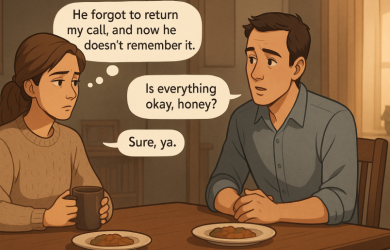17 Passive-Aggressive Things People Say in Relationships

Unlock Daily 30-Sec Tips for a Happier Relationship
👉 Subscribe FREEKey Takeaways
Marriage.com AI Quick Summary
Ever heard a partner say, “Fine, do whatever you want,” or “I thought you’d know better by now”? These are classic examples of passive-aggressive things people say, where resentment is communicated indirectly rather than openly.
In relationships, passive-aggressive phrases often creep in when partners feel frustrated but avoid direct confrontation. Instead of addressing the issue, they express their discontent through sarcasm, guilt-tripping, or dismissive remarks.
Though these comments may seem harmless on the surface, they can undermine trust, intensify conflicts, and leave issues unresolved.
Whether used intentionally or out of habit, such communication disrupts emotional intimacy and prevents healthy dialogue. Recognizing these behaviors is essential to fostering open, honest conversations that strengthen the bond between partners.
What is a passive-aggressive comment in a relationship?
Passive-aggressive statements in a relationship are indirect expressions of anger or frustration, often masked as innocuous comments.
Instead of openly communicating their feelings, someone might say “I’m fine,” when they’re clearly not, or “It’s whatever you want,” while harboring resentment. They might offer backhanded compliments like, “That’s a…unique choice,” or use sarcasm to convey disapproval.
These statements create confusion and tension, as the true message lies beneath the surface, making it difficult to address the underlying issue.
5 common reasons for passive-aggressive things people say
Passive-aggressive communication often appears subtle but can significantly impact relationships by creating tension, confusion, and emotional distress. Individuals use these indirect expressions of frustration to avoid direct confrontation, sometimes through passive-aggressive text or everyday conversations.
Research shows that even though passive-aggressive behavior is often associated with younger age groups and immaturity.
Understanding the root causes of passive-aggressive things people say can help couples address underlying issues and adopt healthier ways of expressing their feelings.
1. Fear of confrontation
Experts have observed that many people fear conflict, worrying it may lead to arguments or emotional backlash. Instead of addressing concerns openly, they make indirect remarks to avoid tension.
Passive-aggressive statements feel safer, allowing the person to express dissatisfaction without directly facing the consequences of confrontation or rejection from their partner.
2. Low self-esteem
Individuals with low self-esteem may struggle to communicate their needs or emotions effectively. Fearing they aren’t worthy of being heard, they resort to passive-aggressive behavior. These remarks allow them to hint at their feelings without fully revealing their vulnerability, preventing further damage to their already fragile sense of self.
3. Communication skills deficit
Some people lack the skills necessary to express emotions assertively. They might not know how to frame their frustrations in a way that invites constructive dialogue. As a result, they resort to passive-aggressive behavior, unintentionally expressing their feelings through sarcasm, guilt-tripping, or backhanded comments.
4. Cultural background
Certain cultures or upbringings discourage direct confrontation, promoting politeness and harmony. People raised in such environments may find it hard to address grievances openly and resort to passive-aggressive expressions. They may think they’re being polite, but this indirect behavior often leads to confusion and unresolved issues.
5. Unresolved issues
When past conflicts remain unaddressed, frustration can build up over time. Instead of revisiting old issues, individuals express their anger through passive-aggressive comments. These remarks often serve as subtle reminders of unresolved grievances, creating a cycle of dissatisfaction that undermines the relationship.
5 effects of passive-aggressive statements in a relationship
Passive-aggressive behavior in relationships can significantly damage emotional well-being and communication. When unresolved frustrations manifest through subtle jabs or sarcasm, it can create tension and misunderstandings.
Learning to identify passive-aggressive things people say and recognizing their impact is essential. Additionally, understanding how to respond to passive-aggressive text can help couples address issues before they escalate into deeper conflicts.
1. Erosion of trust
Passive-aggressive statements undermine trust by making it difficult to communicate openly. When one partner uses subtle jabs or sarcasm, the other may feel manipulated or deceived. Over time, partners may stop believing in each other’s intentions, creating emotional distance and making it challenging to build a strong foundation of honesty.
2. Increased conflict
Though passive-aggressive comments may seem like an attempt to avoid conflict, they often escalate tensions. Indirect communication leads to misunderstandings and frustration. Small issues remain unresolved and can accumulate, triggering bigger arguments. This pattern creates a toxic cycle where resentment builds, and even minor disagreements turn into major confrontations.
3. Emotional distress
Both partners experience emotional strain from passive-aggressive interactions. The person receiving these comments may feel invalidated or confused, not knowing how to respond. Meanwhile, the individual expressing passive-aggression often harbors unresolved anger. This emotional turmoil can erode mental well-being, leaving both partners feeling trapped in negative emotions.
4. Stagnation of communication
Passive-aggressive behavior stifles meaningful conversations, as it replaces honest dialogue with avoidance. When one or both partners regularly use indirect expressions of frustration, it becomes difficult to address core issues. Over time, this lack of openness halts the growth of the relationship, making it harder to achieve emotional intimacy or problem resolution.
Identifying passive-aggressive things people say can encourage more direct and constructive communication.
17 passive-aggressive things people say in a relationship
Passive-aggressive communication is often described as expressing negative emotions indirectly. In relationships, it can involve subtle jabs, sarcasm, or dismissive remarks instead of honest communication.
These passive-aggressive things people say build emotional distance, leaving issues unresolved. If left unchecked, they can gradually erode trust, increase misunderstandings, and create frustration between partners, making it difficult to foster genuine connection and intimacy.
1. “Fine, do whatever you want.”
This phrase is a classic example of passive-aggressive things people say. On the surface, it seems like permission, but underneath, it conveys frustration or disapproval. The speaker often feels disregarded or unheard but avoids saying it directly, creating tension.
2. “I guess I’m just not important enough.”
This statement indirectly expresses hurt feelings by making the partner feel guilty. Instead of communicating the real issue, it implies neglect, putting emotional pressure on the other person to respond.
3. “I thought we agreed on this, but whatever.”
Here, the speaker hints at unmet expectations or disappointment but avoids a direct discussion about it. The “whatever” suggests giving up on the conversation, leaving the other person confused or defensive.
4. “I’m not upset, I’m just tired.”
This statement deflects any attempt to address an emotional issue, leaving the partner guessing. It often signals underlying frustration that the speaker doesn’t want to confront openly.
5. “You always know how to ruin a good time.”
By using sarcasm, this phrase accuses the partner of being a killjoy without directly addressing the problem. It implies blame, which can create resentment in the relationship.
6. “Oh, I didn’t realize I was supposed to be perfect.”
This response is a sarcastic way of avoiding accountability, making it difficult for the partner to express concerns. It shifts the focus to an exaggerated statement rather than the actual issue.
7. “I didn’t want to bother you.”
This phrase implies that the partner is not interested or caring enough, even though it sounds self-effacing. It fosters guilt in the other person without directly stating a need or request.
8. “Sure, that sounds great. I guess I’ll just stay home alone.”
This is a subtle way to make the partner feel bad about their plans without stating a desire for inclusion. It creates emotional tension by implying neglect.
9. “I thought you would have learned by now.”
This phrase suggests that the partner is repeatedly making the same mistakes, but it avoids a clear conversation. It can come off as patronizing and hurtful.
10. “You always say that, but nothing ever changes.”
This statement conveys frustration about unmet promises but in a way that discourages further dialogue. It implies that talking is pointless, which can create a communication barrier.
11. “I’m not saying you’re wrong, but…”
This phrase sounds like an attempt to avoid criticism, but it sets up a negative comment. It leaves the partner confused about whether the statement is meant to be supportive or critical.
12. “Thanks for finally noticing.”
This sarcastic phrase hints at feelings of being ignored or underappreciated. Rather than directly expressing disappointment, it fosters guilt in the other person.
13. “I guess I should just keep my opinions to myself.”
This statement conveys resentment about feeling unheard, but it shuts down further conversation. The partner is left guessing about what the speaker truly wants to say.
14. “If that’s how you feel, then I won’t say anything.”
This phrase implies disapproval of the partner’s feelings while pretending to be neutral. It can make the other person feel invalidated or pressured to change their stance.
15. “You do you.”
This phrase sounds supportive but is often used dismissively to signal frustration or disagreement. It creates distance rather than fostering understanding.
16. “I don’t want to start anything.”
This phrase implies that the speaker has grievances but is unwilling to discuss them openly. It leaves issues unresolved and creates lingering tension.
17. “It’s whatever, I’m over it.”
Although this statement suggests indifference, it usually signals unresolved emotions. It ends the conversation without addressing the underlying issue, leading to further frustration.
Passive-aggressive things people say like the examples above may seem trivial in isolation, but over time, they undermine emotional intimacy. Recognizing these behaviors is the first step to transforming communication from manipulative to constructive, allowing partners to express emotions directly and resolve conflicts effectively.
To learn more about the power of words, watch this video:
Conclusion
If you recognize passive-aggressive things people say creeping into your relationship, take action now. Open and honest communication is crucial to building trust and resolving issues before they escalate.
While passive-aggressive statements may seem like a way to avoid conflict, they only foster resentment and emotional distance over time. Instead of masking frustrations, express your thoughts directly and encourage your partner to do the same.
Small steps like practicing empathy and active listening can transform how you both navigate disagreements.
Remember, healthy relationships thrive on transparency and mutual respect. Address the root causes behind your emotions and work together to replace passive-aggression with constructive conversations. The effort you invest today will lead to deeper connection and long-term happiness.
 Tips
Tips
Write your tip or submit a video tip
All tips are reviewed before the publishing.
Share this article on
Want to have a happier, healthier marriage?
If you feel disconnected or frustrated about the state of your marriage but want to avoid separation and/or divorce, the marriage.com course meant for married couples is an excellent resource to help you overcome the most challenging aspects of being married.
Recent Articles
Related Quizzes
Unlock Daily 30-Sec Tips for a Happier, Healthier Relationship
👉 Subscribe FREE on YouTube We'd love your feedback!
We'd love your feedback!
 Expert Q&A
Expert Q&A
Ask your question related to this topic & get the support you deserve from experts.



















 Thanks for your feedback!
Thanks for your feedback!